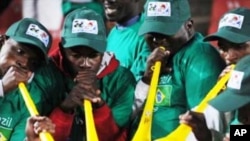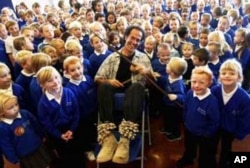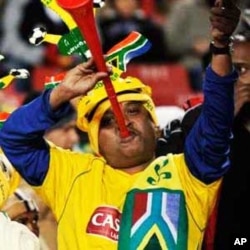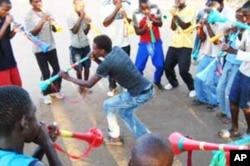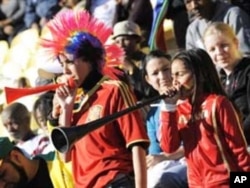Thousands blown in unison buzz like a furious swarm of killer bees, an evil, dread-inducing thrum. A few blown together conjure up images of stampeding, trumpeting elephants, or shrill, piercing blasts from truck air horns. They’re hated across the globe for their cacophonous qualities.
But the vuvuzela plastic trumpets are loved by many South African football fans and are set to define the sound of Africa’s first-ever World Cup.
“This deeply disturbs me,” says musicologist Pedro Espi-Sanchis. “I cannot bear the idea of the musical legacy of 2010 being just that…drone.”
The South African of Spanish origin is an internationally renowned expert on African music.
“It is unthinkable to me because (the vuvuzela as it’s currently blown) is an injustice to African music and to African culture,” Espi-Sanchis says.
Yet the man who’s spent almost 40 years studying traditional African musical instruments is equally adamant that the vuvuzela – if used correctly – is capable of making “beautiful” music at the World Cup.
Misunderstood and misused
Espi-Sanchis describes the vuvuzela as a “proudly South African instrument” with “deep, ancient” roots in local traditional music. The plastic trumpet, he says, is based on the large Kudu antelope horns that indigenous groups blew to summon villagers to meetings.
Now, vuvuzelas are mass-produced and painted in team colors, often with the team’s emblem emblazoned on the side. They’re blown by fans to support their teams “or to frighten the hell out of opponents,” as Espi-Sanchis puts it.
“The problem is that people aren’t playing it properly. They’re just blowing it as hard as they can to make an awful racket.” “The vuvuzela,” he says, “is misunderstood and misused.”
Espi-Sanchis insists the way South African football supporters currently play the vuvuzela – blowing it as powerfully as possible, whenever possible – “severely limits” the instrument. It thus produces only one note – an “extremely loud” B-flat that could damage people’s hearing.
Espi-Sanchis argues that vuvuzelas are supposed to be played “softer, more subtly.”
No one, he says, is getting the fans to play the same song or to have the same rhythm. “So all you hear in the stadiums is this uncoordinated, noisy mess.”
To prove that the vuvuzela is capable of making “great” music, Espi-Sanchis has formed the “Vuvuzela Orchestra.” The ensemble, the first of its kind, recently released a song, “Abafana,” in support of South Africa’s football team, known as Bafana Bafana.
In the song, vuvuzelas accompany other traditional South African musical instruments, such as township pennywhistles. Espi-Sanchis says “Abafana” offers evidence of the “unexplored potential” of the vuvuzela.
“It’s a rousing instrument that can, when played correctly, take its place in an orchestra as easily as a flute, violin or cello,” he says.
Sea of melodies
The musicologist says vuvuzelas, when tuned properly, are actually capable of producing seven “chords” – two longer G and F notes, four shorter C, D and E variants, and a high F.
Espi-Sanchis’s orchestra plays different, but synchronized rhythms, creating a “sea of melodies.”
He insists it would be “quite simple” for football fans to do the same at World Cup matches.
“The orchestra members are untrained musicians – just like the vast majority of football supporters,” he says.
Espi-Sanchis has drawn and color-coded chords to make them easier to learn.
“You don’t have to know music or be a musician. You just have to be enthusiastic about being part of (a) musical event.”
To make it even easier for vuvuzelas to be used musically, Espi-Sanchis suggests they’re manufactured in seven different colors, with each color being capable of playing one specific note. Then, at certain times during a match, the stadium authorities could flash the different vuvuzela colors on the big screens, and indicate on the screens which particular section of the crowd should play which note.
“You come in (to the ground), you buy your vuvuzela at the gate, you look at the screen when you come in, and you blow when you see your color. It’s as simple as that, okay?”
In theory, it’s that simple…. But “practically speaking,” Espi-Sanchis acknowledges it’s “probably too late” to reach the masses of vuvuzela-blowing South Africans with his strategy to revolutionize the instrument and improve its sound.
Emergency plan
The musician has an “emergency plan” to save the World Cup’s musical legacy –one that would incorporate the thousands of vuvuzela blowing fans.
“We must involve them,” he says, “Because there are like 10,000 of them in a stadium and you cannot fight them! You have to work with them!”
He’s asked World Cup organizers to allow his orchestra to play at the opening game of the tournament between South Africa and Mexico on June 11th. Fans would be guided to play along with his orchestra.
This opening match could be watched by more than a billion people around the world. So Espi-Sanchis says it’s “essential” that South African supporters create a good impression.
Using his specially formulated chords, he’s arranged various traditional South African football songs especially for the vuvuzela.
“By means of a loud trumpet, the orchestra can announce the song and lead the song, and keep fans in pitch, and we’ll use a drummer to keep everyone on the same beat…. We’ve tested all of this, and it’s possible,” Espi-Sanchis says.
But he’s yet to hear from the authorities. “So far there’s been no reaction from the organizers other than confirmation that they’ve received my proposal and are considering it.”
Trumpets of Jericho
Nevertheless, Espi-Sanchis says, even if his proposal is rejected, he won’t abandon the “faith” he has in the vuvuzela and will continue his mission to transform the way it sounds.
“I believe the standard vuvuzela has not reached its (full) power,” he says. “It’s going to reach its (full) power when you can get 10,000 or 20,000 vuvuzelas playing the same rhythm, at the same time. Can you imagine that? Can you imagine the sound? The trumpets of Jericho!”
If this were to happen, he says, it could drive South Africa on to unexpected glory at the World Cup.
“Real South African chants and lyrics, set to real South African music, will stir the players’ emotions to a far greater degree than mere noise,” he says.
But, at this stage, it appears the sound of the 2010 World Cup will be the drone of thousands of ear-splitting, garbled B-flat eruptions, instead of the rich, powerful and melodic music that South Africans are famous for.
